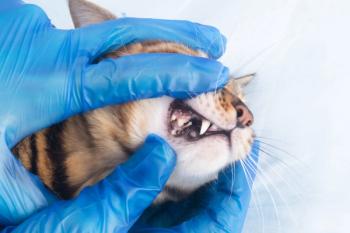
Equine dentistry under examination by profession
Lay "technicians" practicing equine dentistry in Oregon may have to pack their bags, transporting their services to a state where they're welcome.
Lay "technicians" practicing equine dentistry in Oregon may have to pack their bags, transporting their services to a state where they're welcome.
Effective Jan. 1, 2004, the state of Oregon's revised practice act, which prohibits non-veterinarians from practicing dentistry, among other specialties such as chiropractic, now has more teeth, according to state officials.
For the first time, it's now a misdemeanor for non-veterinarians to practice such specialties without a license.
Sponsoring S.B. 256 is Sen. Kurt Schrader, a small animal veterinarian. The bill gives subpoena power to the veterinary board of examiners for records and receipts; it also allows the board to assess up to a $5,000 civil penalty against violators of the practice act.
Instrumental in getting the bill passed into law is Dr. Daniel Harrison, equine dental practitioner in Bend, Ore., who, aided by other veterinarians, started writing letters to the state veterinary association several years ago, raising awareness about dentistry, or the "latest trendy specialty."
"We impressed upon them that the dentistry issue was coming to the front page and that we needed to attack the non-licensed lay dental technicians performing dentistry," Harrison says. "Approaching it from the consumer protection angle, the consumer is not in a position to evaluate if this individual that claims to be doing equine dentistry is doing good work or not.
"My feeling is that if we could use that $5,000 penalty as a deterrent to these tooth fairies practicing without a license and without accountability, we'd make it difficult for them to practice in the state," Harrison says.
Harrison, who serves on the American Association of Equine Practitioners' (AAEP) dentistry committee, is hopeful other states might reconsider tightening the belt on what he calls "pseudo-experts" in dentistry.
Potential domino effect
Until now, the opposite has held true. The majority of changes to state practice acts, until Oregon's latest ruling, reflected a lowering of restrictions, enabling equine dentistry to be done by those other than veterinarians, with some restrictions, reports Dr. Tom Allen, an equine veterinarian and dentist, who attributes the many advances in the field to the lay dentist community.
Dr. Tom Allen
Currently, in many states, lay "dentists" are allowed to practice dentistry under direct supervision of a veterinarian.
"If the restrictions are lowered and more people besides veterinarians are allowed to do dentistry, that could be a good thing," Allen says, because "dentistry is going to be the next big longevity increase for horses."
Whether the longevity issue holds weight, Harrison contends the real problem lies in lay 'dentists' questionable qualifications.
"Lay people who do dentistry call themselves dental technicians. They get that nomenclature off a bogus school. Legally a technician is an individual employed as a veterinary technician with at least four calendar years of on-the-job training at a veterinary hospital or with a certificate in veterinary technology from an approved college," he says.
The "bogus school" Harrison refers to is the International Academy of Equine Dentistry, which offers independent testing and unrecognized certification for lay persons to become dental practitioners.
To answer the need for standard certification, one AAEP source says the association may eventually work toward finding a universal certification program to meet the standards acceptable by the horse owner, veterinary community and lay dentists.
While Allen agrees a number of lay dental practitioners are renegade, he says that those who abide by the rules are needed more than ever, thanks to an increased demand from the horse-owning public. Allen, who serves on AAEP's dentistry committee and authored a text on equine dentistry, expresses concern there aren't enough veterinarians to meet the rising demands.
Keeping up with demands
Allen argues that a veterinarian wanting to practice dentistry might successfully be able to handle a caseload of 2,000 to 2,500 horses a year. In many states where there may be at least 600,000 horses, maybe three veterinarians practice dentistry, he says. "That tells us veterinarians cannot get it done (alone)."
"Increasing restrictions so only veterinarians can perform dentistry, even though it may be part of veterinary medicine, it's just not going to happen that veterinarians are going to do a substantial amount in the near future," Allen says.
Well aware of the increased demand for dentistry is a man who, according to experts, has made significant inroads in pioneering the field.
Making inroads
Currently, a lecturer on equine dental procedures at the University of California, Davis (UC Davis), Tony Basile is a self-proclaimed non-veterinary equine dental practitioner, nationally recognized for developing equine periodontal and other dental procedures.
He says he goes an extra mile to practice under law, not against it, like he admits some of his non-veterinary colleagues do.
And, to date, he's largely earned the respect of the veterinary and non-veterinary community. AAEP even used some of his dental equipment and procedures at a sold-out AAEP wet lab this year, though the course was actually taught by a veterinarian who worked with Basile.
Six years ago, Basile says he was "lucky" if he received a call from one or two veterinarians in a year; since then, he has worked with and taught more than 500 veterinarians.
Nonetheless, speaking frankly, Basile says, "What wound up happening as the field progressed, it got to the point where (many) veterinarians were trying to stop equine dental technicians."
He says he saw the trend coming and, starting with New Jersey, found out what it took to make him 100 percent legal, which meant working under the supervision of a veterinarian. States vary widely on restrictions.
"I have 100 percent followed the rules up to the point I work at a university. I will not touch a horse without the veterinarian present," he says.
For the dentistry field to continue blossoming, Basile says it's imperative that veterinary schools' curriculum take ownership, which is slowly happening. To date, Texas A&M University is the only school to offer two electives in equine dentistry, while the University of Georgia offers one elective and clinics, and schools like UC Davis and others offer minimal coursework.
Leadership up to school
"More and more, veterinarians are learning the importance of equine dentistry. But right now it's not consistently on the college curriculums. What it comes down to is they don't have room for it," Basile explains.
Dr. Mike Lowder at the University of Georgia, conducted a study in 1997 that revealed a paucity of equine dental education at universities. He says the situation is evolving positively and now plans to repeat the study. "Dentistry is one of the fastest-growing areas in the curriculum," Lowder says.
AAEP agrees dental education in veterinary curriculum must play catch up to other specialties. The overriding goal of the association's dentistry committee is to promote education, according to Dr. Tom Lenz, immediate past president. "There's a strong interest in the profession and AAEP's approach is to ensure they receive adequate training."
AAEP tack
Harrison, on AAEP's dentistry committee, says AAEP has an unofficial five-pronged attack related to dentistry:
- Educate veterinary students on how to be better dentists. Work to revamp curriculums.
- Release revised AAEP standards on appropriate dentistry.
- Urge state legislatures to address practice acts to tighten legal requirements of dentistry practice in veterinary medicine, Harrison reports. (Officially, AAEP did not confirm this plan. Lenz says, "The association of AAEP tends to focus nationally and leave the state issues up to the state veterinary associations.")
- Educate the older veterinarian unfamiliar with the latest advances in dentistry.
- Educate public on why they should use a veterinarian for dentistry needs.
Harrison explains, "We are creating a situation through our education and training to make it set up so that the consumer that hires these lay 'dentists' would rather have a veterinarian working on his or her horse."
Lenz clarifies AAEP's position on lay dentistry. "AAEP is not necessarily opposed to lay people doing dentistry. We are concerned - because most of these horses have to be sedated - that frequently lay dentists are administering tranquilizers or drugs that they're not licensed to do. Lay dentists doing dentistry doesn't bother us. But we certainly think a veterinarian needs to be involved in it."
Basile of UC Davis says that while certain factions may like to see the dental technician be outmoded, he senses a camaraderie among the majority of veterinarians. "The practitioner on average is respecting more the knowledge that the equine dental technician has brought into this over the past 25-30 years, and the improvement in equipment and procedures."
Camaraderie possible
But Basile is not naïve. "The future direction of dentistry is going into the hands of the veterinarian if it continues the way it is. The equine dental technician will be a dinosaur."
Newsletter
From exam room tips to practice management insights, get trusted veterinary news delivered straight to your inbox—subscribe to dvm360.




